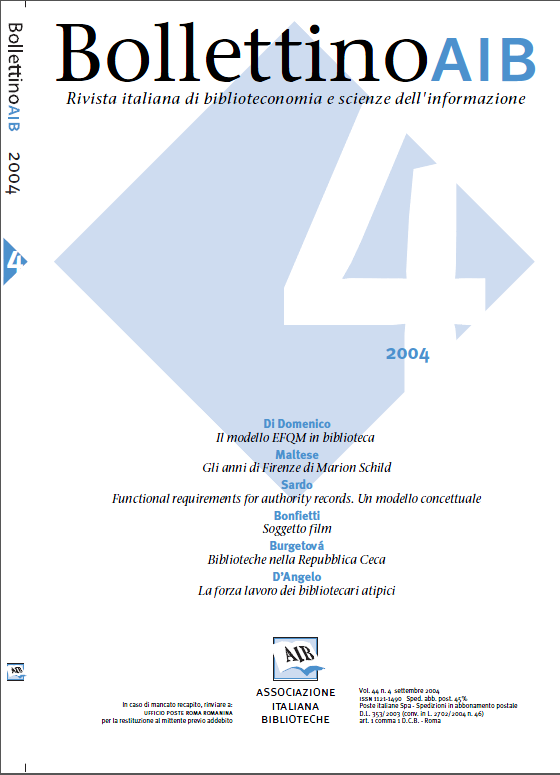Autovalutazione, qualità, eccellenza: il modello EFQM in biblioteca
Contenuto principale dell'articolo
Abstract
Starting from the 1990s, the library world began to deal with the organizational culture of quality, with studies and applications that referred mainly to Total Quality Management (TQM), to ISO standards and the questions of customer (user) satisfaction. The new ISO 9000 standard in this matter, greatly influenced by TQM, aroused a certain amount of interest for such questions as standardization, implementation of management systems for quality and certification.
The culture and horizon of quality, especially in public and service structures, can moreover still be extended, and this in more than one aspect: greater involvement of the stakeholders in evaluation and service improvement activities, greater orientation towards the mapping and replanning of organizational processes, greater attention to the specific systems of quality in the contexts in which the processes of management and knowledge-sharing are central, greater availability of tools for self-assessment. All this should be arranged, hopefully, within a practice of quality that should be on the one hand easy to handle and, on the other, capable of integrating in one strategy various methods of application.
A particularly fruitful and functional model for enriching the quality systems in the library is that proposed by the European Foundation for Quality Management (EFQM).
This method is again openly inspired by the TQM, but is not of an obligatory nature and it acknowledges that there are a number of approaches to the pursuit of excellence. The EFQM offers itself as an evaluation tool available to organizations: it helps them to systematically and globally measure the progress achieved towards attaining excellence, to understand their delays, to find improvement solutions. It also has the virtue of looking beyond the horizon of certification, but can be easily connected with the adoption of the ISO 9000 standard.
The article illustrates the EFQM method in which the emphasis falls on the measurement of effectiveness and of customer/user satisfaction, on the achievement of the performance objectives and on the management of the processes. With respect to the ISO quality standards, the latter point in particular demonstrates a more noticeable sensitivity of the EFQM model towards the continuous planning of the processes themselves, of the products and of the services. In more general terms, the culture of quality and excellence expressed by the EFQM model is recommended, not only because of the "pluralistic" goals, but also because of its clear accent on the development of professional skills, the acknowledged importance assigned to the excellence/knowledge connection (fundamentally absent in the ISO 9001:2000 and 9004:2000 standards), the encouragement to develop advanced forms of cooperation and because of the elements of opening towards the theme of the social impact of quality.
Some interesting experiments of this model are illustrated. These were carried out within Spanish university libraries.
Approaches, systems and tools for a serious, shared practice, one that is also occasionally of self-assessment: without a doubt this is the greatest contribution that the EFQM model is already providing to libraries, to their search for quality and, in some cases, for excellence.
The culture and horizon of quality, especially in public and service structures, can moreover still be extended, and this in more than one aspect: greater involvement of the stakeholders in evaluation and service improvement activities, greater orientation towards the mapping and replanning of organizational processes, greater attention to the specific systems of quality in the contexts in which the processes of management and knowledge-sharing are central, greater availability of tools for self-assessment. All this should be arranged, hopefully, within a practice of quality that should be on the one hand easy to handle and, on the other, capable of integrating in one strategy various methods of application.
A particularly fruitful and functional model for enriching the quality systems in the library is that proposed by the European Foundation for Quality Management (EFQM).
This method is again openly inspired by the TQM, but is not of an obligatory nature and it acknowledges that there are a number of approaches to the pursuit of excellence. The EFQM offers itself as an evaluation tool available to organizations: it helps them to systematically and globally measure the progress achieved towards attaining excellence, to understand their delays, to find improvement solutions. It also has the virtue of looking beyond the horizon of certification, but can be easily connected with the adoption of the ISO 9000 standard.
The article illustrates the EFQM method in which the emphasis falls on the measurement of effectiveness and of customer/user satisfaction, on the achievement of the performance objectives and on the management of the processes. With respect to the ISO quality standards, the latter point in particular demonstrates a more noticeable sensitivity of the EFQM model towards the continuous planning of the processes themselves, of the products and of the services. In more general terms, the culture of quality and excellence expressed by the EFQM model is recommended, not only because of the "pluralistic" goals, but also because of its clear accent on the development of professional skills, the acknowledged importance assigned to the excellence/knowledge connection (fundamentally absent in the ISO 9001:2000 and 9004:2000 standards), the encouragement to develop advanced forms of cooperation and because of the elements of opening towards the theme of the social impact of quality.
Some interesting experiments of this model are illustrated. These were carried out within Spanish university libraries.
Approaches, systems and tools for a serious, shared practice, one that is also occasionally of self-assessment: without a doubt this is the greatest contribution that the EFQM model is already providing to libraries, to their search for quality and, in some cases, for excellence.
Dettagli dell'articolo
Fascicolo
Sezione
Articoli

Questo lavoro è fornito con la licenza Creative Commons Attribuzione - Condividi allo stesso modo 4.0.
